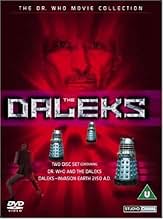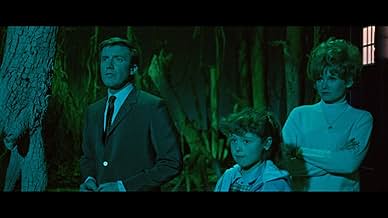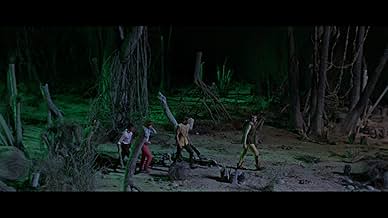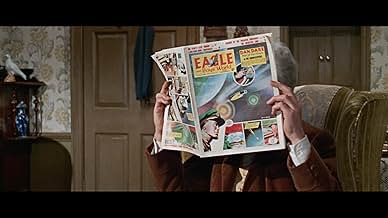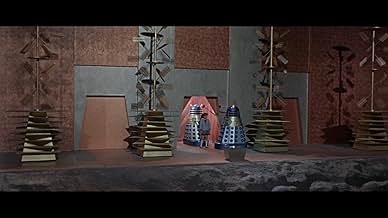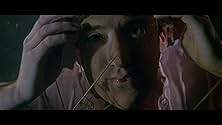VALUTAZIONE IMDb
5,6/10
5648
LA TUA VALUTAZIONE
Aggiungi una trama nella tua linguaAn eccentric inventor and his companions travel in his TARDIS to the Planet Skaro and battle the evil menace of the Daleks.An eccentric inventor and his companions travel in his TARDIS to the Planet Skaro and battle the evil menace of the Daleks.An eccentric inventor and his companions travel in his TARDIS to the Planet Skaro and battle the evil menace of the Daleks.
- Regia
- Sceneggiatura
- Star
Nicholas Head
- Thal
- (as Nicolas Head)
Mike Lennox
- Thal
- (as Michael Lennox)
Recensioni in evidenza
An elderly scientist named Doctor Who invents a machine that can travel through time and space called the TARDIS. He lives with his two granddaughters, Barbara and Susan. Barbara has a bumbling boyfriend named Ian who accidentally turns the TARDIS on and transports the four of them to an alien planet inhabited by the peaceful Thals and the destructive Daleks. Doctor Who tries to convince the Thals to reclaim their planet before the Daleks detonate a neutron bomb.
First things first, we have to put aside comparisons to the TV Doctor Who. There's very little that's similar between the two, even though this movie is based off of one of the earliest stories from the show. The Doctor is human not an alien time lord and his name is literally Doctor Who here, not The Doctor. Judging this by its own merits, I thought it was watchable and sometimes even good. Peter Cushing is enjoyable, as are Jennie Linden and Robert Tovey as his granddaughters. Linden looks quite good in her pink capris. I wasn't crazy about Roy Castle, particularly when he's trying to be funny. It's filmed in a lovely Technicolor, which I always appreciate. The effects and sets may appear cheesy to some today but I think they're very creative and fun, as sci-fi designs usually were back in the day. The music's pretty good, too. This isn't likely to appeal to many modern Who fans but I think people who like Peter Cushing and Amicus will find something to enjoy about this.
First things first, we have to put aside comparisons to the TV Doctor Who. There's very little that's similar between the two, even though this movie is based off of one of the earliest stories from the show. The Doctor is human not an alien time lord and his name is literally Doctor Who here, not The Doctor. Judging this by its own merits, I thought it was watchable and sometimes even good. Peter Cushing is enjoyable, as are Jennie Linden and Robert Tovey as his granddaughters. Linden looks quite good in her pink capris. I wasn't crazy about Roy Castle, particularly when he's trying to be funny. It's filmed in a lovely Technicolor, which I always appreciate. The effects and sets may appear cheesy to some today but I think they're very creative and fun, as sci-fi designs usually were back in the day. The music's pretty good, too. This isn't likely to appeal to many modern Who fans but I think people who like Peter Cushing and Amicus will find something to enjoy about this.
I have fond memories of seeing this at the cinema (a treat on a friend's birthday) when it first came out. I was a big Dr Who fan anyway as a 12 year old, and this big screen colour adaptation of the 2nd Dr Who serial and first Dalek story was just what the Doctor ordered.
It never occurred to me, as a 12 year old in 1965, that the Doctor was a mere human and not a Time Lord from Gallifrey, and that was because, at the time, he was a mere human and not a Time Lord from Gallifrey on TV, too. That particular wrinkle wasn't introduced until long after the first couple of Dalek TV series and the two movies.
That said, while the film brings back fond memories, and is particularly good to see in widescreen, it is very much a product of its time, and specifically targetted at its market - youngsters who were mad keen on Daleks. That market is not there any more. The movie shows its age, and doesn't stand up that well to today's demands. For all that, there's still a genuine sense of jeopardy involved, the principals play well, the production values are (for the time and the UK cinema industry) very high, and it remains good, colourful innocent fun.
It never occurred to me, as a 12 year old in 1965, that the Doctor was a mere human and not a Time Lord from Gallifrey, and that was because, at the time, he was a mere human and not a Time Lord from Gallifrey on TV, too. That particular wrinkle wasn't introduced until long after the first couple of Dalek TV series and the two movies.
That said, while the film brings back fond memories, and is particularly good to see in widescreen, it is very much a product of its time, and specifically targetted at its market - youngsters who were mad keen on Daleks. That market is not there any more. The movie shows its age, and doesn't stand up that well to today's demands. For all that, there's still a genuine sense of jeopardy involved, the principals play well, the production values are (for the time and the UK cinema industry) very high, and it remains good, colourful innocent fun.
The eccentric doctor Who (the always watchable Peter Cushing) takes his familiars , a little girl (Tovey) and a young woman (Jennie Linden , Women in love) along with her fiancé (Roy Castle) on a trip throughout space and time . They're transported to another world and end up on a planet inhabited by strange and peace-loving people fighting the mutants named Daleks . These are robot-like and belong to kind of war-mongering mutant creatures who have hidden their brittle bodies in armour shells . The planet has been devastated by an atomic war and they must help the humans facing the Daleks , living various adventures with creepy landscapes , spooky monsters and deep cliffs . Finally , they're wrongfully transported to Roman empire .
This is an enjoyable cinematic adaptation about the interminable British television series . The ever popular Peter Cushing is magnificent reviving his classic interpretation as Dr. Who , furthermore a beautiful Jennie Linden and a sympathetic Roy Castle . The film displays a a rare electronic music and colorful and glimmer cinematography by John Wilcox , Hammer's usual . It's followed by ¨Daleks , invasion Earth 2150 AD¨ about title mutants who are trying to take over Earth . Others Dr. Who for television in the long-running serial are Tom Baker , Paul McGann and Christopher Eccleston . The motion picture is professionally directed by Gordon Fleming . He's a fine director such as ¨The split¨ about a blaxploitation heist and ¨Philby , Burgues and McLean , spy scandal of the century¨ , a chilling tale about tree of Britain's most notorious spies and ¨Daleks 2150¨ . The flick will appeal to Sci-Fi fans and juvenile public.
This is an enjoyable cinematic adaptation about the interminable British television series . The ever popular Peter Cushing is magnificent reviving his classic interpretation as Dr. Who , furthermore a beautiful Jennie Linden and a sympathetic Roy Castle . The film displays a a rare electronic music and colorful and glimmer cinematography by John Wilcox , Hammer's usual . It's followed by ¨Daleks , invasion Earth 2150 AD¨ about title mutants who are trying to take over Earth . Others Dr. Who for television in the long-running serial are Tom Baker , Paul McGann and Christopher Eccleston . The motion picture is professionally directed by Gordon Fleming . He's a fine director such as ¨The split¨ about a blaxploitation heist and ¨Philby , Burgues and McLean , spy scandal of the century¨ , a chilling tale about tree of Britain's most notorious spies and ¨Daleks 2150¨ . The flick will appeal to Sci-Fi fans and juvenile public.
If, like me, you enjoy checking out the reviews *before* seeing the film, here's the premise in a nutshell: A mishap with silver-haired scientist Doctor Who's latest invention hurls the cast through space and time, landing them in the midst of an eerie alien wasteland. The Doctor's companions on this unanticipated adventure are his granddaughters Susan and Barbara, and Barbara's boyfriend Ian. Needing parts to repair their damaged time machine, the company seeks help in a nearby city, only to be captured and imprisoned by the ruthless mechanical Daleks, a race of machine-bound mutants bent on world domination.
To followers of the original TV series, this plot will be as familiar as the Daleks' squawking cries of 'Exterminate,' and despite some changes to the cast (most notably the Doctor being portrayed as a human), it faithfully captures the spirit of the early programs. For viewers who've never experienced the original Who, or who don't have a taste for early pulp-style adventure sci-fi, this movie will probably be less appealing. It's a fan flick pure and simple, expressly designed to capitalize on the wave of Dalekmania that swept Britain in the mid-1960s following the show's BBC premiere.
Ironically, the film's weakest link is the Daleks themselves. The writers and producers were no doubt keen to capitalize on the popularity of the metal meanies, but it has to be said that the Daleks really don't have much of a screen presence. With their absolute lack of expression, clumsy movement, and painfully slow, mechanical, grating voices, they should never have been scripted to carry any scenes by themselves; however (alas) there are more than a few passages in the film that consist of nothing more than Dalek cross-talk acts, with one metal peppergrinder haltingly rasping its lines to another. Still, I'm one who's been spoiled by the routinely mind-blowing special effects of the 21st century; to Britons of the '60s, the stuff I find boring might have seemed menacing.
Daleks aside, the most memorable aspect of the film is the eye-popping color. The filmmakers pulled out all the stops to give the sets a wonderfully vibrant feel, liberally filling every scene with multi-hued Daleks, glowing control panels, or eerily-lit alien landscapes. This film was the first opportunity for fans to see Doctor Who in color (sorry, `colour'), and they certainly got it in spades. (The original TV series didn't drop the black-and-white format until 1970, five years later.)
The film's greatest strength is its casting, with the best performance by far coming from veteran actor Peter Cushing, best known to U.S. audiences as Grand Moff Tarkin in Star Wars. Cushing's delivery is predictably brilliant, and helps bring conviction and flair to a script that might otherwise come off as unbearably campy. As the Doctor he's also just plain likeable - much more so in fact than his TV counterpart (played by William Hartnell) who often came off as crusty and gruff. Roberta Tovey as the young Susan also gives a marvelous performance, something that's a true rarity among kid actors. Jennie Linden does an adequate job as Barbara, though her character has no clear role in the story and was probably just included to suggest continuity with the TV series, while Roy Castle provides some (generally successful) comic relief with his portrayal of the bumbling klutz Ian. Kudos also to Barrie Ingham (Thal leader Alydon) for actually giving a credible performance from beneath false eyelashes and a blonde wig.
The bottom line? The film's a little too far removed from modern tastes to be enjoyed by the average Joe, but to Who fans and sci-fi aficionados it'll be a delight.
To followers of the original TV series, this plot will be as familiar as the Daleks' squawking cries of 'Exterminate,' and despite some changes to the cast (most notably the Doctor being portrayed as a human), it faithfully captures the spirit of the early programs. For viewers who've never experienced the original Who, or who don't have a taste for early pulp-style adventure sci-fi, this movie will probably be less appealing. It's a fan flick pure and simple, expressly designed to capitalize on the wave of Dalekmania that swept Britain in the mid-1960s following the show's BBC premiere.
Ironically, the film's weakest link is the Daleks themselves. The writers and producers were no doubt keen to capitalize on the popularity of the metal meanies, but it has to be said that the Daleks really don't have much of a screen presence. With their absolute lack of expression, clumsy movement, and painfully slow, mechanical, grating voices, they should never have been scripted to carry any scenes by themselves; however (alas) there are more than a few passages in the film that consist of nothing more than Dalek cross-talk acts, with one metal peppergrinder haltingly rasping its lines to another. Still, I'm one who's been spoiled by the routinely mind-blowing special effects of the 21st century; to Britons of the '60s, the stuff I find boring might have seemed menacing.
Daleks aside, the most memorable aspect of the film is the eye-popping color. The filmmakers pulled out all the stops to give the sets a wonderfully vibrant feel, liberally filling every scene with multi-hued Daleks, glowing control panels, or eerily-lit alien landscapes. This film was the first opportunity for fans to see Doctor Who in color (sorry, `colour'), and they certainly got it in spades. (The original TV series didn't drop the black-and-white format until 1970, five years later.)
The film's greatest strength is its casting, with the best performance by far coming from veteran actor Peter Cushing, best known to U.S. audiences as Grand Moff Tarkin in Star Wars. Cushing's delivery is predictably brilliant, and helps bring conviction and flair to a script that might otherwise come off as unbearably campy. As the Doctor he's also just plain likeable - much more so in fact than his TV counterpart (played by William Hartnell) who often came off as crusty and gruff. Roberta Tovey as the young Susan also gives a marvelous performance, something that's a true rarity among kid actors. Jennie Linden does an adequate job as Barbara, though her character has no clear role in the story and was probably just included to suggest continuity with the TV series, while Roy Castle provides some (generally successful) comic relief with his portrayal of the bumbling klutz Ian. Kudos also to Barrie Ingham (Thal leader Alydon) for actually giving a credible performance from beneath false eyelashes and a blonde wig.
The bottom line? The film's a little too far removed from modern tastes to be enjoyed by the average Joe, but to Who fans and sci-fi aficionados it'll be a delight.
When visiting his girlfriend Barbara, Ian is given a tour of the TARDIS by Dr Who. However he accidentally activates it and sends them to an unknown planet. Keen to explore they find themselves prisoners in a city controlled by the Daleks. The Daleks seek to rule the whole planet and get rid of the peace loving natives. When Dr Who et al accidentally help the Daleks to achieve this, they have no choice but to work with the natives to stop the Daleks.
Made to cash in on the huge popularity mid-sixties of both Dr Who and the Daleks, this film version has much higher values than the TV show, but doesn't mean it's better. The story is weak like an introduction to the Doctor. It's very basic and provides little opportunity for thrills right up until the final battle. It's not that bad, but for a film you'd expect more.
The Daleks themselves are good but the film uses them badly we see them as things trapped in a city with little power outside of their own walls. To make matters worse them seem very vulnerable and easy to beat all you have to do is push them very hard! They also don't `do' dialogue very well they are used several times for long scenes where they talk to each other and explain the plot to the audience, these scenes are poor as their delivery mixed with the dialogue is terrible!
Cushing makes a good doctor and is better than many of the TV incarnations. Record breaking Roy Castle is quite good as Ian, but his comedy clowning doesn't really fit in with the tone of the film. The female lead is vapid but Susan (played by Tovey) is actually pretty good.
Overall this is TV standard fans will enjoy it but anyone looking for thrills or good plotting will be disappointed. Check out Dalek Invasion Earth that is a much better use of these tin-can bad guys.
Made to cash in on the huge popularity mid-sixties of both Dr Who and the Daleks, this film version has much higher values than the TV show, but doesn't mean it's better. The story is weak like an introduction to the Doctor. It's very basic and provides little opportunity for thrills right up until the final battle. It's not that bad, but for a film you'd expect more.
The Daleks themselves are good but the film uses them badly we see them as things trapped in a city with little power outside of their own walls. To make matters worse them seem very vulnerable and easy to beat all you have to do is push them very hard! They also don't `do' dialogue very well they are used several times for long scenes where they talk to each other and explain the plot to the audience, these scenes are poor as their delivery mixed with the dialogue is terrible!
Cushing makes a good doctor and is better than many of the TV incarnations. Record breaking Roy Castle is quite good as Ian, but his comedy clowning doesn't really fit in with the tone of the film. The female lead is vapid but Susan (played by Tovey) is actually pretty good.
Overall this is TV standard fans will enjoy it but anyone looking for thrills or good plotting will be disappointed. Check out Dalek Invasion Earth that is a much better use of these tin-can bad guys.
Lo sapevi?
- QuizAs an incentive Roberta Tovey (who was 11 at the time the film was produced) was paid a shilling (5p) by director Gordon Flemyng every time she did a scene in one take. She made so much money, Flemyng didn't offer her the same deal for the sequel. For the modern day comparison, a shilling from 1965 had the buying power of £1 now, or about $1.30.
- BlooperUnless the TARDIS crew has shrunk at the close of the film, the stock Roman Legion footage is out-of-scale with the on-set actors.
- Curiosità sui creditiRobert Jewell is wrongly credited as Robert Jewel.
- ConnessioniEdited into Dr. Who and the Daleks (2013)
I più visti
Accedi per valutare e creare un elenco di titoli salvati per ottenere consigli personalizzati
Dettagli
- Data di uscita
- Paese di origine
- Lingua
- Celebre anche come
- Dr. Who y los Daleks
- Luoghi delle riprese
- A Stage, Shepperton Studios, Shepperton, Surrey, Inghilterra, Regno Unito(Dalek City interiors)
- Aziende produttrici
- Vedi altri crediti dell’azienda su IMDbPro
Botteghino
- Budget
- 180.000 £ (previsto)
- Lordo in tutto il mondo
- 114.062 USD
- Tempo di esecuzione
- 1h 22min(82 min)
- Colore
- Proporzioni
- 2.35 : 1
Contribuisci a questa pagina
Suggerisci una modifica o aggiungi i contenuti mancanti



